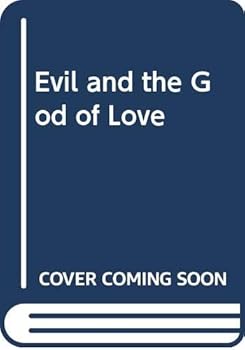Evil and the God of Love
Select Format
Select Condition 
Book Overview
When first published, Evil and the God of Love instantly became recognized as a modern theological classic, widely viewed as the most important work on the problem of evil to appear in English for... This description may be from another edition of this product.
Format:Paperback
Language:English
ISBN:0060639024
ISBN13:9780060639020
Release Date:January 1978
Publisher:HarperCollins Publishers
Length:401 Pages
Weight:0.88 lbs.
Dimensions:1.0" x 5.3" x 8.0"
Customer Reviews
3 ratings
An intelligently argued work but for me not the answer
Published by Thriftbooks.com User , 18 years ago
Probably the major question the great monotheistic religions must deal with is the question of how an omnipotent omnibenevolent God has created a world in which there is Evil. Another way of saying this, is given by the Psalmist ' A righteous man and bad for him, an evil man and good for him.' Or in G.H. Hopkins version , "Why do sinners ways prosper, and all I endeavor disappointment end?' Hicks tries to provide an answer through a reading of the work of the Christian theologian Ireneaus .Essentially Hicks maintains that God aims to provide goodness and perfection for His creatures. And that Evil is that which impairs this process of perfection. The ultimate answer to this as Hicks sees it can only be given in the world- to - come. To my mind this answer does not even begin to answer the first question of Theodicy i.e. why is there even one suffering child in the world, one person in pain who knows tremendous suffering though they are not responsible for it. Hicks restates his central argument as follows: "I have been arguing... that the actual universe, with all its good and evil, exists on the basis of God's will and receives its meaning from His purpose. However, these two conclusions do not stand in simple contradiction , to one another. The one says that evil is bad, harmful, destructive, fearful and to be fought against as a matter of ultimate life and death. But the other does not deny this. It does not say that evil is not fearful and threatening, inimical to all good and to be absolutely resisted. It says that God has ordained a world which contains evil- real evil- as a means to the creation of the infinite good of a Kingdom of Heaven within which His creatures will have come as perfected persons to love and serve Him through a process in which their own free insight and response have been an essential element. The bridge between the two standpoints is provided by the Christian hope of the Kingdom of God. The compatibility between the 'existensial' view of evil as utterly malevolent and harmful and the theological view of it as divinely permitted and over- ruled ,is a form of the compatibility between the temporary process which we know by our own present immersion within it, and the future completion and transformation of it which we affirm by faith." This is an interesting answer but it does not answer for me the question of the suffering of the innocents, the pain they go through. It too does not address the fact that there are evils so horrible that they would seem to be all out of proportion to any possible compensation or overcoming. Nonetheless this work is a carefully argued exposition of a problem of great importance to very many religious believers. A work which addresses the subject from the perspective of the Jewish Tradition is David Birnbaum's 'Evil and God'
Capricious Omnipotent Overlord or Challenging Parent?
Published by Thriftbooks.com User , 24 years ago
It's been 20 years since I first read Hick's book. Looking back, that experience proved to be a definitive turning point in my life. John Hick presents two philosophies which Christians have used to explain the existence of evil in a universe created by a "good" God. The first philosophy states that God's plan is ineffable--we ought to have faith & not question. What we see as evil, with our limited, mortal vision, is just one feature of God's marvelous plan for the cosmos. The second philosophy seeks to find reason in the occurrence of evil. Hick echos Ortega y Gasset's philosophy that growth does not happen in comfort, but rather when challenged. Hick adopts this second philosophy, tracing it back to Origen. Since growth, or soul building, is the purpose of life, Hick argues that God must ensure that everybody achieves the growth necessary for "paradise." This leads to espousing reincarnation, where the soul continues to evolve, until maturity.
Fresh thoughts on Theodicy
Published by Thriftbooks.com User , 26 years ago
He is a serious, yet not mainline Christian theologian who gives a lot of new ideas on Theodicy. If you are a mainline Christian, you may not agree with some of his premises, but if you read the book, it will open your mind.






